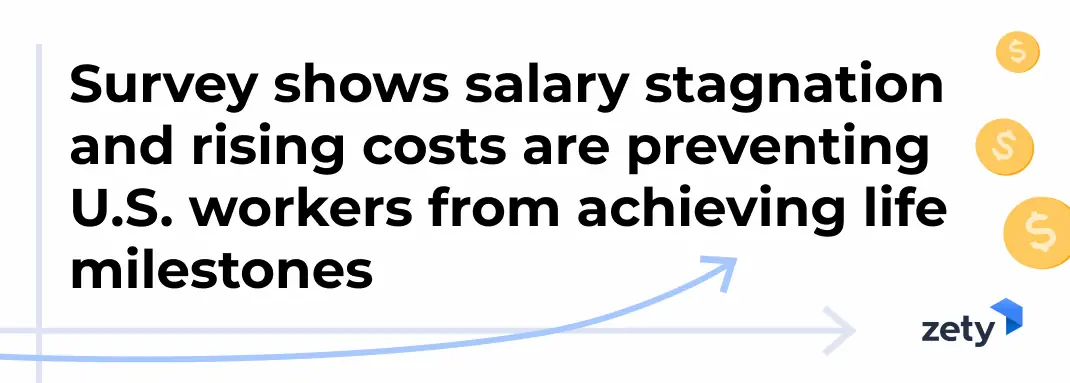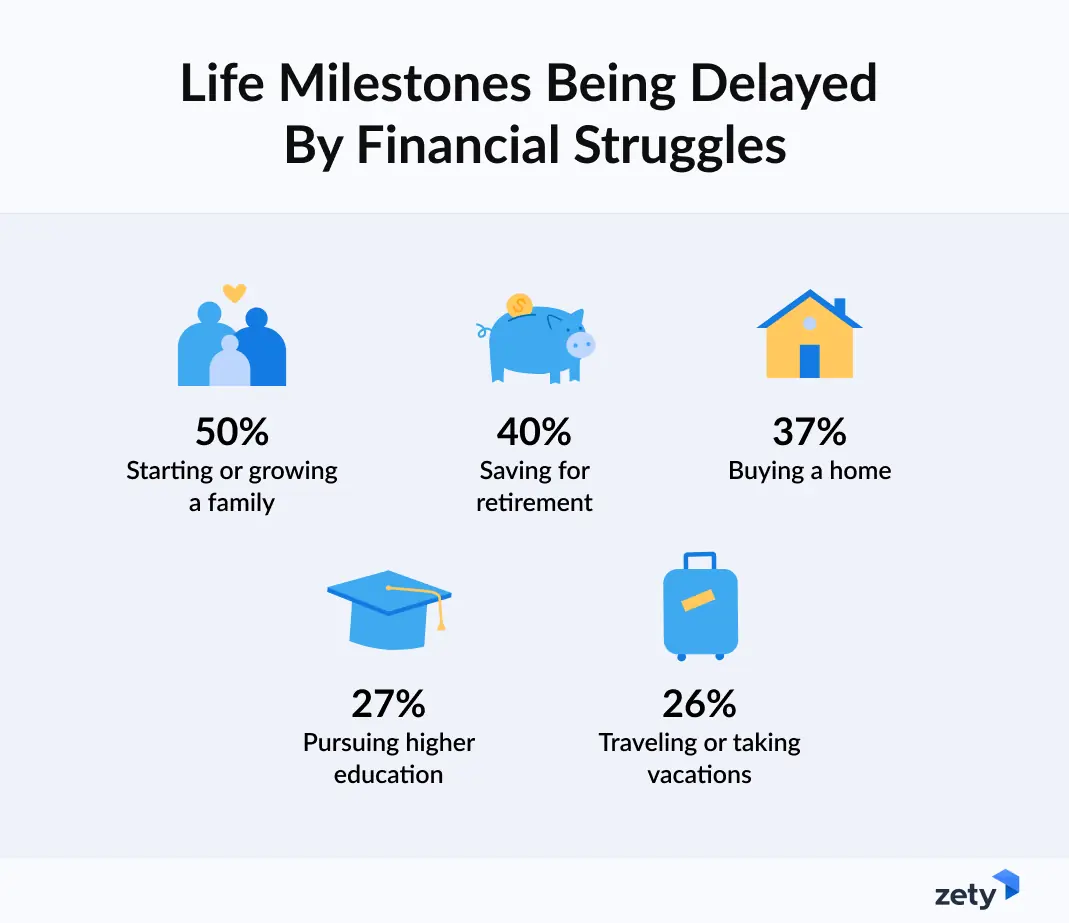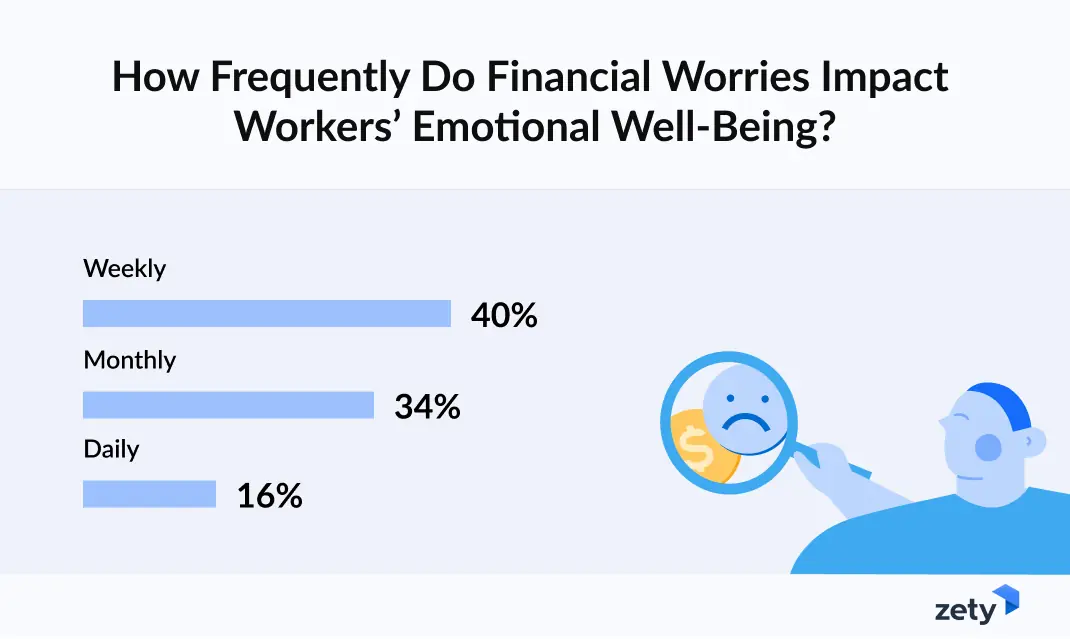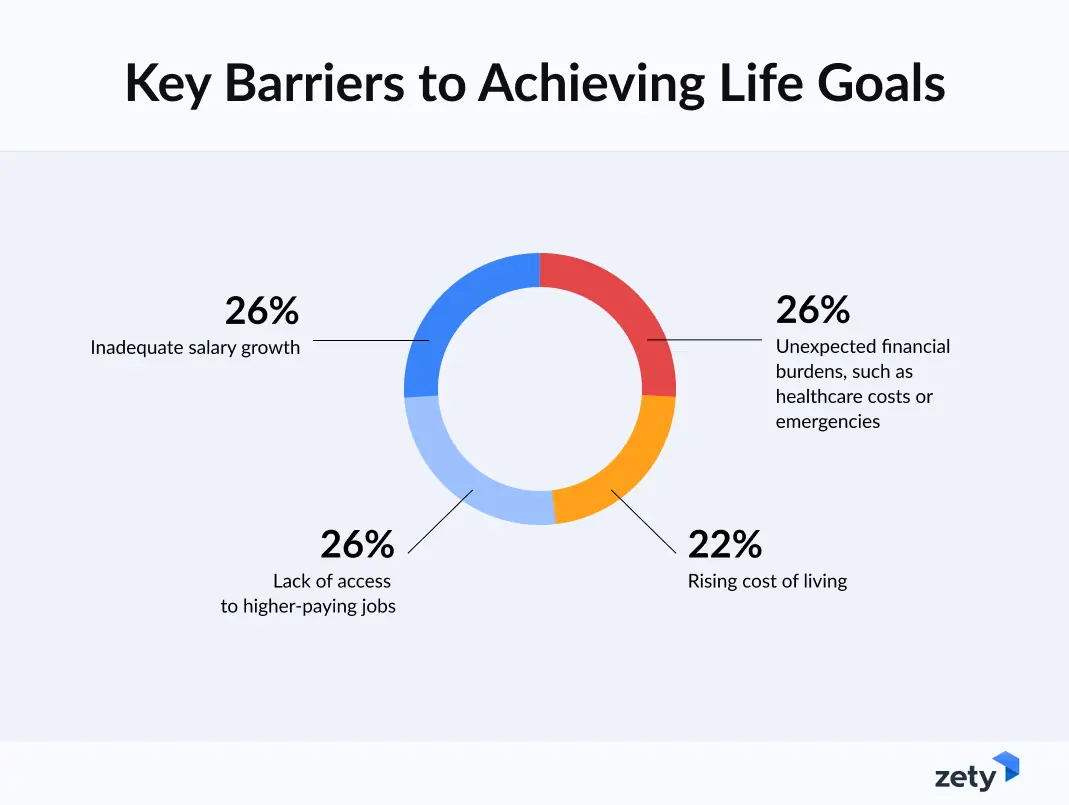
As the cost of living rises and wages fail to keep pace, workers across the U.S. are feeling more hopeless about their future, a new Zety survey reveals. Based on a study of 1,065 U.S. workers in December 2024, the Priced Out of Progress Report highlights alarming gaps in salary that are making some of life’s major milestones—like homeownership, starting a family, and retirement—feel increasingly out of reach.
The survey also sheds light on the impact these financial concerns are having on workers' psyches, with 90% of participants reporting that their financial situation impacts their emotional well-being on a monthly, weekly or even daily basis.
Survey Highlights:
- 40% of workers can’t save for retirement.
- 37% say buying a home is financially out of reach.
- 50% say starting or growing a family feels impossible on their current salary.
- 36% of workers feel hopeless, anxious, or frustrated about their ability to achieve life goals on their current salary.
- 70% of workers feel disengaged due to their current pay.
- 36% feel less motivated to go beyond their core job responsibilities.
- 90% report that their emotional well-being is regularly affected by their financial concerns.
Dreams Deferred: Financial Struggles Delay Life Milestones
Across the board, financial concerns are impacting people's ability to achieve life goals. When asked which life goals workers feel financially unable to achieve on their current salary, several top concerns emerged.
- Starting or growing a family: 50%
- Saving for retirement: 40%
- Buying a home: 37%
- Pursuing higher education: 27%
- Traveling or taking vacations: 26%

The Emotional Toll: Financial Stress is Affecting More Than Paychecks
Workers are not just struggling with their bank accounts—they’re grappling with the emotional fallout of salary stagnation, with 90% reporting that their emotional well-being is regularly affected by their financial concerns.
- 40% say their financial concerns affect their emotional state weekly, 34% are affected monthly, and 16% daily.
- 36% report feeling less motivated to put in extra effort at work.
- 26% are actively looking for new opportunities as a result of their financial stress.

What this means: Financial concerns are not just impacting workers' bank accounts but also taking a significant toll on their emotional well-being, motivation, and engagement at work, with many struggling to stay focused or feeling compelled to seek new opportunities.
Financial Barriers to Achieving Life Goals
Workers identified several key barriers to achieving their goals, with salary gaps and rising costs standing out as major hurdles:
- 26% cite inadequate salary growth as the biggest barrier.
- 26% believe they lack access to higher-paying jobs.
- 26% mention unexpected financial burdens, such as healthcare costs or emergencies.
- 22% point to the rising cost of living.

What this means: Stagnant salaries, rising costs, and unexpected expenses are preventing workers from achieving key life milestones, leaving many feeling stuck and unable to progress toward their goals.
Salary's Impact on Career Motivation and Job Satisfaction
The pressure of not earning enough is also affecting career ambition and job satisfaction:
- 27% of workers feel less hopeful about career growth due to their current salary.
- 26% are motivated to look for new opportunities that pay more.
- 36% feel less motivated to go beyond their core responsibilities.
- 20% focus more on finding ways to increase their income rather than improving their work performance.
What this means: Inadequate salaries are undermining workers' ambition and satisfaction, leading to disengagement and a stronger focus on finding higher-paying roles rather than excelling in their current positions.
Financial Stress is Driving Career Decisions
The weight of financial stress is prompting many workers to make career choices driven by money rather than passion:
- 45% have taken on extra responsibilities at work to boost their pay.
- 35% have considered leaving their current job for a higher-paying opportunity.
- 29% say financial stress has lowered their motivation to advance in their career.
- 29% have switched jobs multiple times in pursuit of better pay.
- 20% have chosen to prioritize job security over career growth due to financial pressures.
What this means: Financial instability is forcing workers to prioritize immediate income over long-term career aspirations, with many taking on extra responsibilities, switching jobs, or compromising their goals for job security.
The survey results reveal a trend of financial instability undermining workers' aspirations and emotional well-being. The inability to achieve significant life milestones, such as homeownership or retirement, extends beyond financial struggles—it reflects a deeper loss of hope and optimism about the future on the part of U.S. workers.
For press inquiries, please contact Skyler Acevedo at skyler.acevedo@bold.com.
Methodology
The findings provided were gathered through a survey conducted with 1,065 American workers on December 11, 2024. Participants were queried about their feelings on their current salary and ability to achieve their life goals. Participants responded to various question types, including yes/no questions, open-ended questions, scale-based questions gauging agreement levels, and questions that permitted the selection of multiple options from a list of answers.


